ACC320 Semester 2 - Audit Processes & Corporate Failure Proposal
VerifiedAdded on 2023/06/04
|11
|2264
|354
Report
AI Summary
This research proposal investigates the relationship between audit processes and corporate failure in Australian organizations. It highlights the practical motivation stemming from the increasing risk of corporate failure and auditor misconduct in Australia. The theoretical motivation addresses gaps in existing theories by emphasizing the importance of following IFRS and GAAP guidelines, along with the IFAC code of ethics, to mitigate corporate failure risks. The literature review covers the concept of audit and accounting standards, the concept and reasons for corporate failure, and the relationship between audit processes and corporate failure in Australian organizations, referencing various studies and cases. The proposal concludes with a hypothesis stating that audit processes and standards significantly impact corporate failure in Australian organizations. Desklib offers a platform for students to access this and other solved assignments and past papers.
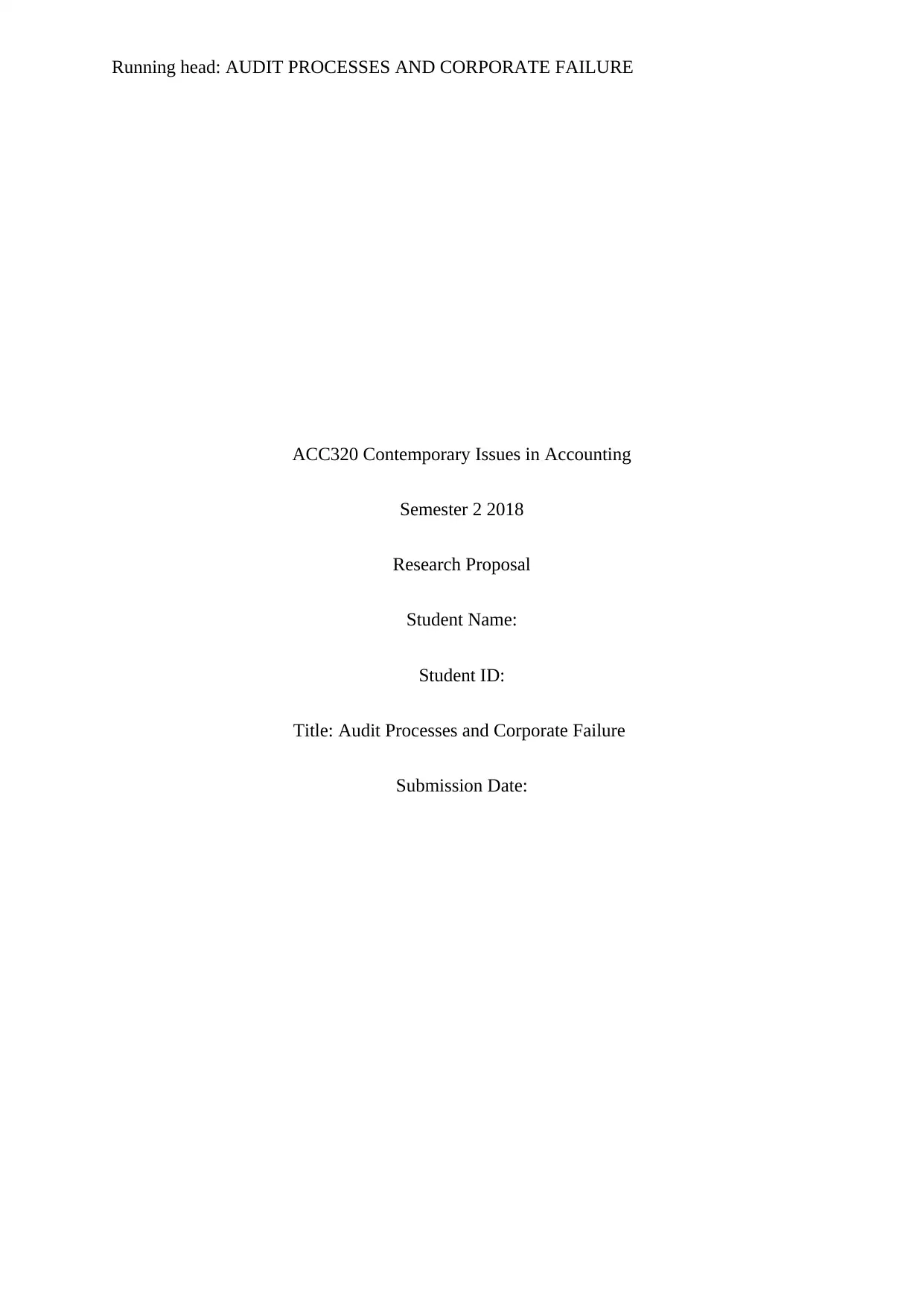
Running head: AUDIT PROCESSES AND CORPORATE FAILURE
ACC320 Contemporary Issues in Accounting
Semester 2 2018
Research Proposal
Student Name:
Student ID:
Title: Audit Processes and Corporate Failure
Submission Date:
ACC320 Contemporary Issues in Accounting
Semester 2 2018
Research Proposal
Student Name:
Student ID:
Title: Audit Processes and Corporate Failure
Submission Date:
Secure Best Marks with AI Grader
Need help grading? Try our AI Grader for instant feedback on your assignments.
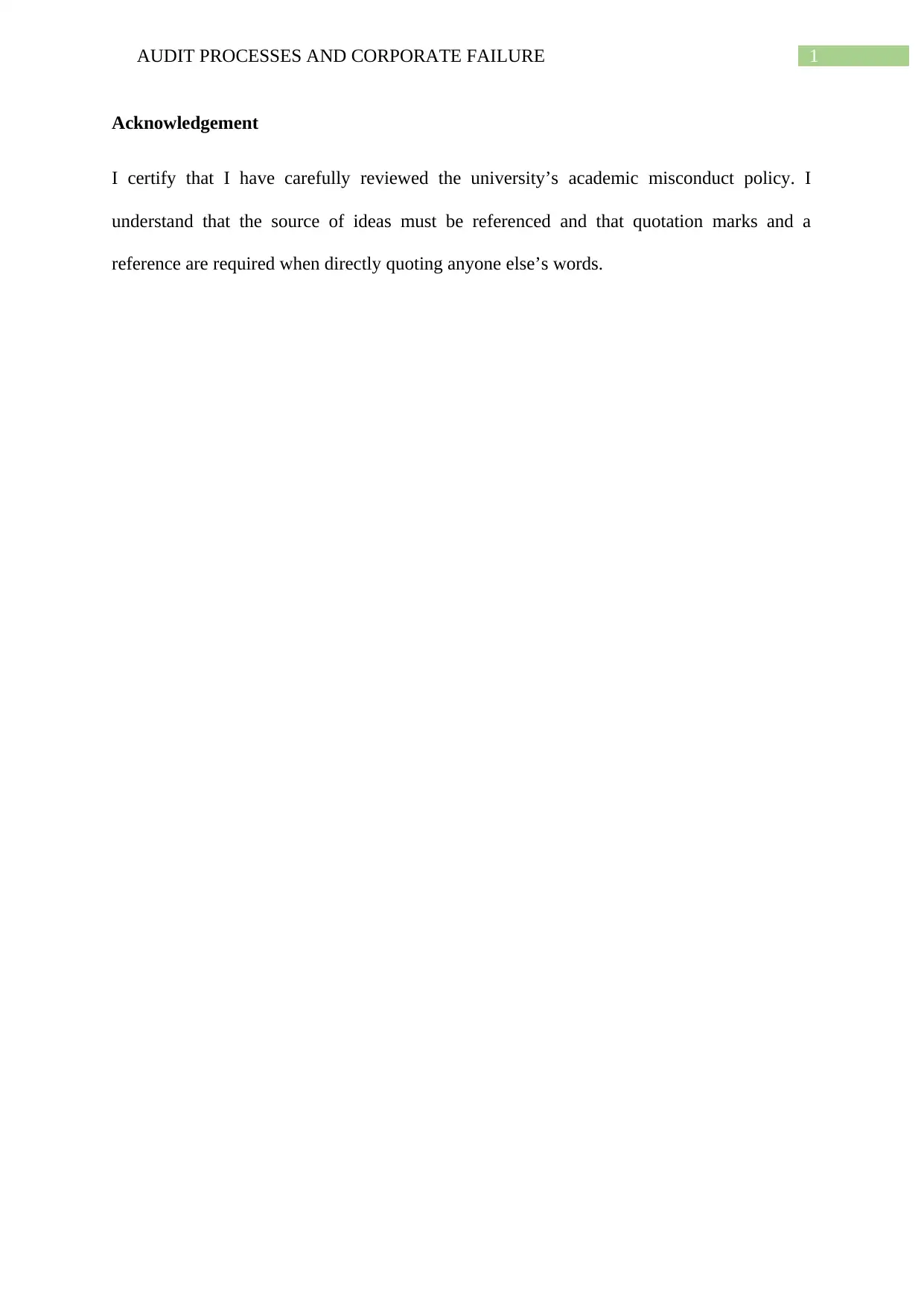
1AUDIT PROCESSES AND CORPORATE FAILURE
Acknowledgement
I certify that I have carefully reviewed the university’s academic misconduct policy. I
understand that the source of ideas must be referenced and that quotation marks and a
reference are required when directly quoting anyone else’s words.
Acknowledgement
I certify that I have carefully reviewed the university’s academic misconduct policy. I
understand that the source of ideas must be referenced and that quotation marks and a
reference are required when directly quoting anyone else’s words.
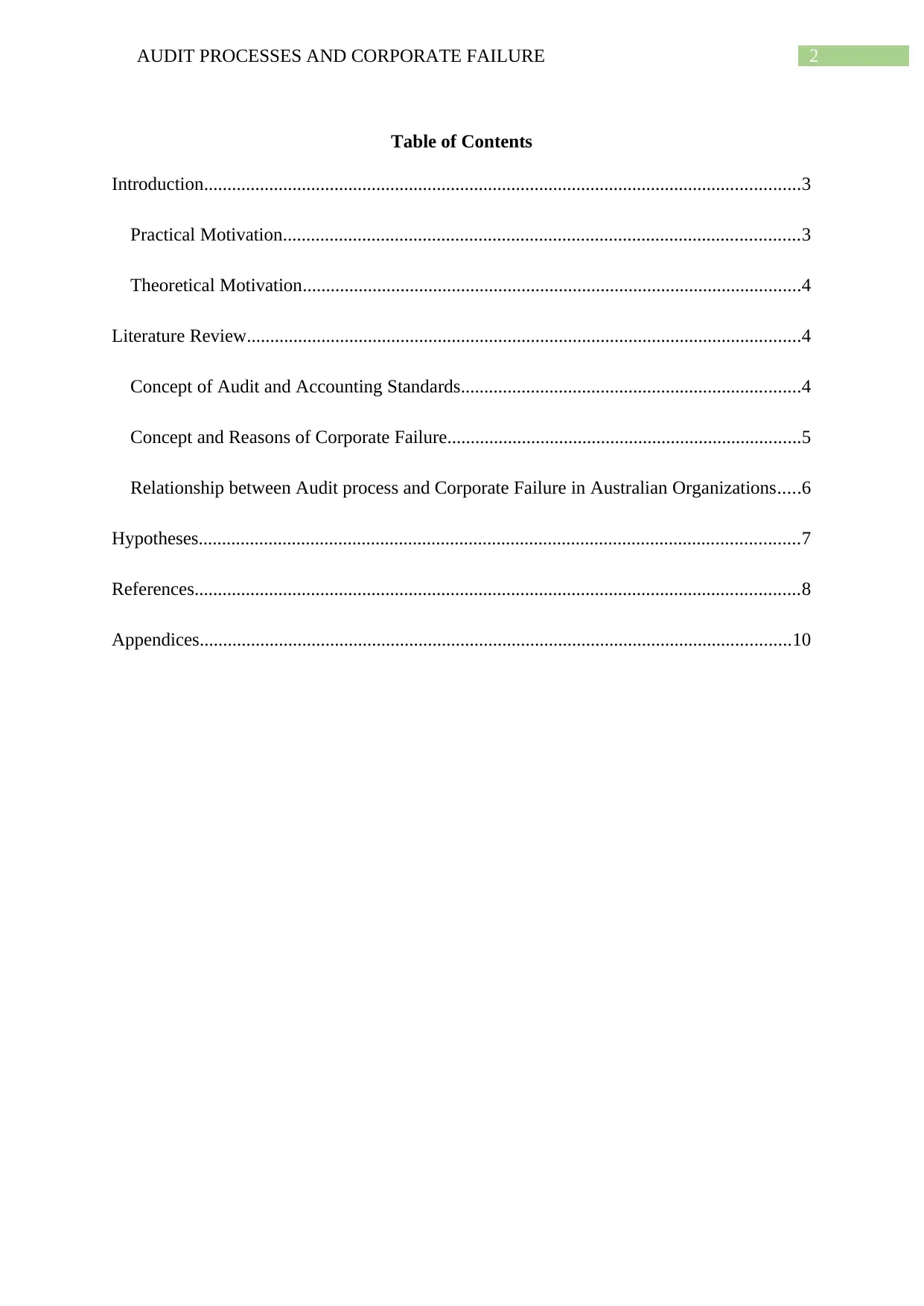
2AUDIT PROCESSES AND CORPORATE FAILURE
Table of Contents
Introduction................................................................................................................................3
Practical Motivation...............................................................................................................3
Theoretical Motivation...........................................................................................................4
Literature Review.......................................................................................................................4
Concept of Audit and Accounting Standards.........................................................................4
Concept and Reasons of Corporate Failure............................................................................5
Relationship between Audit process and Corporate Failure in Australian Organizations.....6
Hypotheses.................................................................................................................................7
References..................................................................................................................................8
Appendices...............................................................................................................................10
Table of Contents
Introduction................................................................................................................................3
Practical Motivation...............................................................................................................3
Theoretical Motivation...........................................................................................................4
Literature Review.......................................................................................................................4
Concept of Audit and Accounting Standards.........................................................................4
Concept and Reasons of Corporate Failure............................................................................5
Relationship between Audit process and Corporate Failure in Australian Organizations.....6
Hypotheses.................................................................................................................................7
References..................................................................................................................................8
Appendices...............................................................................................................................10
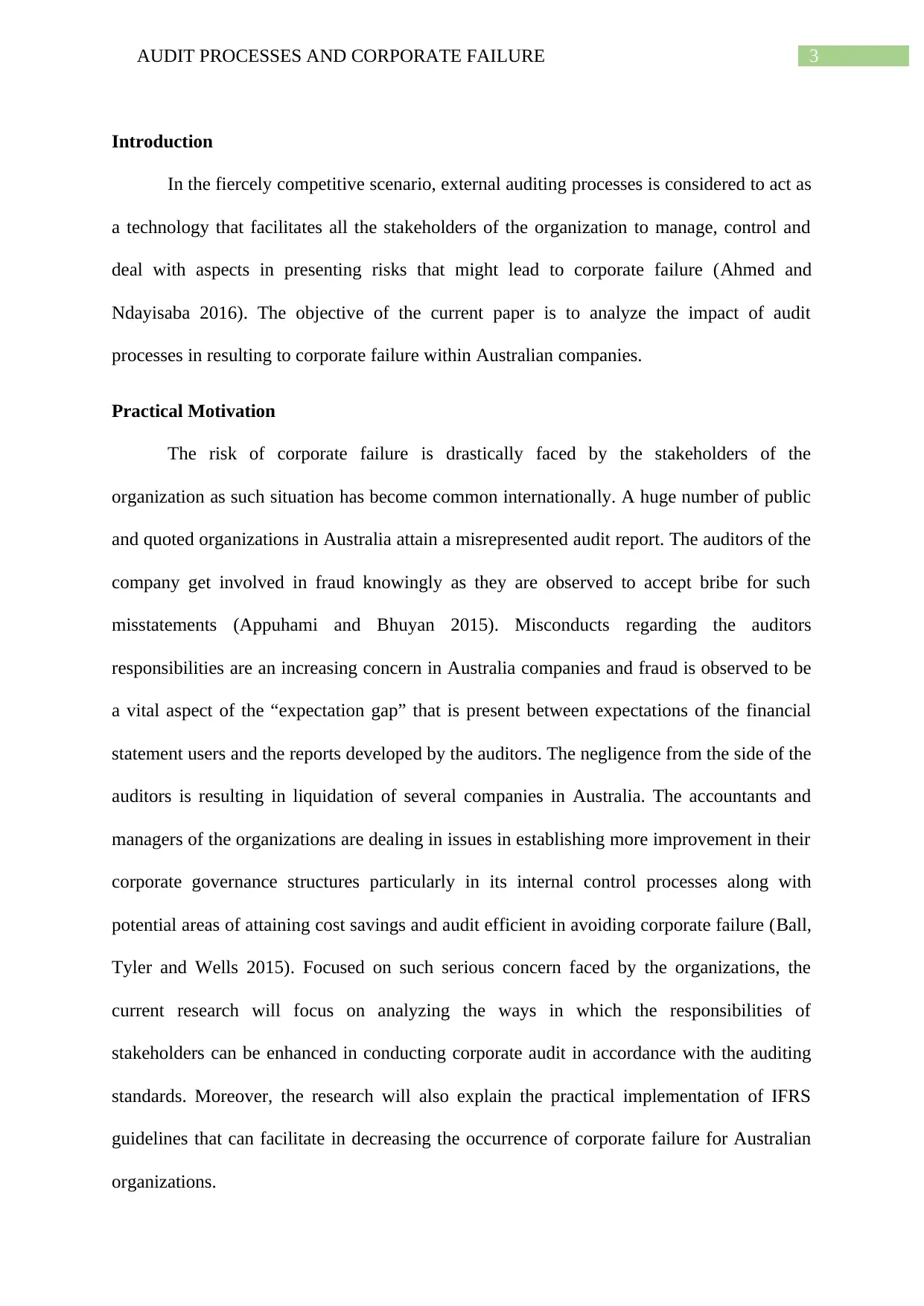
3AUDIT PROCESSES AND CORPORATE FAILURE
Introduction
In the fiercely competitive scenario, external auditing processes is considered to act as
a technology that facilitates all the stakeholders of the organization to manage, control and
deal with aspects in presenting risks that might lead to corporate failure (Ahmed and
Ndayisaba 2016). The objective of the current paper is to analyze the impact of audit
processes in resulting to corporate failure within Australian companies.
Practical Motivation
The risk of corporate failure is drastically faced by the stakeholders of the
organization as such situation has become common internationally. A huge number of public
and quoted organizations in Australia attain a misrepresented audit report. The auditors of the
company get involved in fraud knowingly as they are observed to accept bribe for such
misstatements (Appuhami and Bhuyan 2015). Misconducts regarding the auditors
responsibilities are an increasing concern in Australia companies and fraud is observed to be
a vital aspect of the “expectation gap” that is present between expectations of the financial
statement users and the reports developed by the auditors. The negligence from the side of the
auditors is resulting in liquidation of several companies in Australia. The accountants and
managers of the organizations are dealing in issues in establishing more improvement in their
corporate governance structures particularly in its internal control processes along with
potential areas of attaining cost savings and audit efficient in avoiding corporate failure (Ball,
Tyler and Wells 2015). Focused on such serious concern faced by the organizations, the
current research will focus on analyzing the ways in which the responsibilities of
stakeholders can be enhanced in conducting corporate audit in accordance with the auditing
standards. Moreover, the research will also explain the practical implementation of IFRS
guidelines that can facilitate in decreasing the occurrence of corporate failure for Australian
organizations.
Introduction
In the fiercely competitive scenario, external auditing processes is considered to act as
a technology that facilitates all the stakeholders of the organization to manage, control and
deal with aspects in presenting risks that might lead to corporate failure (Ahmed and
Ndayisaba 2016). The objective of the current paper is to analyze the impact of audit
processes in resulting to corporate failure within Australian companies.
Practical Motivation
The risk of corporate failure is drastically faced by the stakeholders of the
organization as such situation has become common internationally. A huge number of public
and quoted organizations in Australia attain a misrepresented audit report. The auditors of the
company get involved in fraud knowingly as they are observed to accept bribe for such
misstatements (Appuhami and Bhuyan 2015). Misconducts regarding the auditors
responsibilities are an increasing concern in Australia companies and fraud is observed to be
a vital aspect of the “expectation gap” that is present between expectations of the financial
statement users and the reports developed by the auditors. The negligence from the side of the
auditors is resulting in liquidation of several companies in Australia. The accountants and
managers of the organizations are dealing in issues in establishing more improvement in their
corporate governance structures particularly in its internal control processes along with
potential areas of attaining cost savings and audit efficient in avoiding corporate failure (Ball,
Tyler and Wells 2015). Focused on such serious concern faced by the organizations, the
current research will focus on analyzing the ways in which the responsibilities of
stakeholders can be enhanced in conducting corporate audit in accordance with the auditing
standards. Moreover, the research will also explain the practical implementation of IFRS
guidelines that can facilitate in decreasing the occurrence of corporate failure for Australian
organizations.
Secure Best Marks with AI Grader
Need help grading? Try our AI Grader for instant feedback on your assignments.
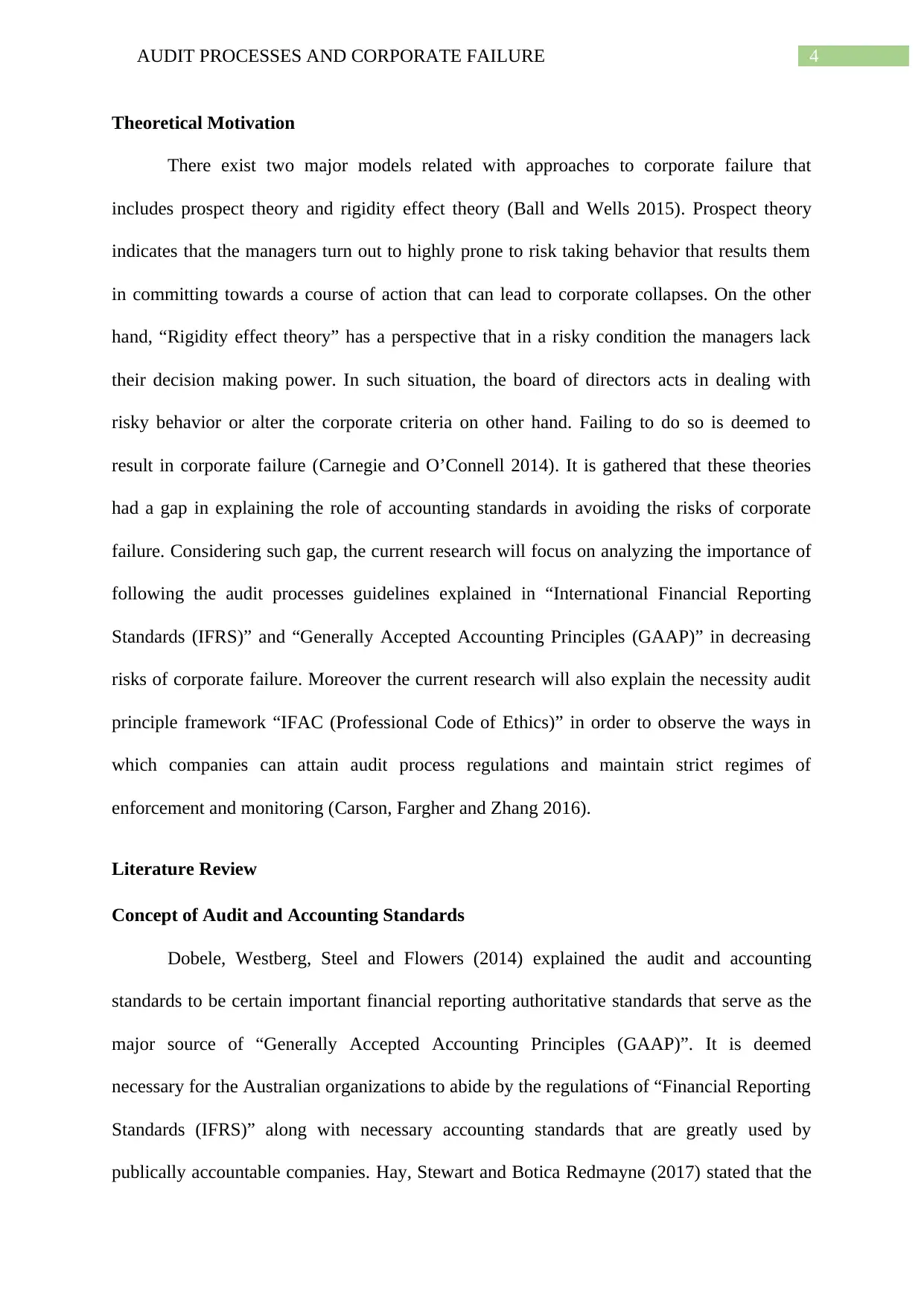
4AUDIT PROCESSES AND CORPORATE FAILURE
Theoretical Motivation
There exist two major models related with approaches to corporate failure that
includes prospect theory and rigidity effect theory (Ball and Wells 2015). Prospect theory
indicates that the managers turn out to highly prone to risk taking behavior that results them
in committing towards a course of action that can lead to corporate collapses. On the other
hand, “Rigidity effect theory” has a perspective that in a risky condition the managers lack
their decision making power. In such situation, the board of directors acts in dealing with
risky behavior or alter the corporate criteria on other hand. Failing to do so is deemed to
result in corporate failure (Carnegie and O’Connell 2014). It is gathered that these theories
had a gap in explaining the role of accounting standards in avoiding the risks of corporate
failure. Considering such gap, the current research will focus on analyzing the importance of
following the audit processes guidelines explained in “International Financial Reporting
Standards (IFRS)” and “Generally Accepted Accounting Principles (GAAP)” in decreasing
risks of corporate failure. Moreover the current research will also explain the necessity audit
principle framework “IFAC (Professional Code of Ethics)” in order to observe the ways in
which companies can attain audit process regulations and maintain strict regimes of
enforcement and monitoring (Carson, Fargher and Zhang 2016).
Literature Review
Concept of Audit and Accounting Standards
Dobele, Westberg, Steel and Flowers (2014) explained the audit and accounting
standards to be certain important financial reporting authoritative standards that serve as the
major source of “Generally Accepted Accounting Principles (GAAP)”. It is deemed
necessary for the Australian organizations to abide by the regulations of “Financial Reporting
Standards (IFRS)” along with necessary accounting standards that are greatly used by
publically accountable companies. Hay, Stewart and Botica Redmayne (2017) stated that the
Theoretical Motivation
There exist two major models related with approaches to corporate failure that
includes prospect theory and rigidity effect theory (Ball and Wells 2015). Prospect theory
indicates that the managers turn out to highly prone to risk taking behavior that results them
in committing towards a course of action that can lead to corporate collapses. On the other
hand, “Rigidity effect theory” has a perspective that in a risky condition the managers lack
their decision making power. In such situation, the board of directors acts in dealing with
risky behavior or alter the corporate criteria on other hand. Failing to do so is deemed to
result in corporate failure (Carnegie and O’Connell 2014). It is gathered that these theories
had a gap in explaining the role of accounting standards in avoiding the risks of corporate
failure. Considering such gap, the current research will focus on analyzing the importance of
following the audit processes guidelines explained in “International Financial Reporting
Standards (IFRS)” and “Generally Accepted Accounting Principles (GAAP)” in decreasing
risks of corporate failure. Moreover the current research will also explain the necessity audit
principle framework “IFAC (Professional Code of Ethics)” in order to observe the ways in
which companies can attain audit process regulations and maintain strict regimes of
enforcement and monitoring (Carson, Fargher and Zhang 2016).
Literature Review
Concept of Audit and Accounting Standards
Dobele, Westberg, Steel and Flowers (2014) explained the audit and accounting
standards to be certain important financial reporting authoritative standards that serve as the
major source of “Generally Accepted Accounting Principles (GAAP)”. It is deemed
necessary for the Australian organizations to abide by the regulations of “Financial Reporting
Standards (IFRS)” along with necessary accounting standards that are greatly used by
publically accountable companies. Hay, Stewart and Botica Redmayne (2017) stated that the
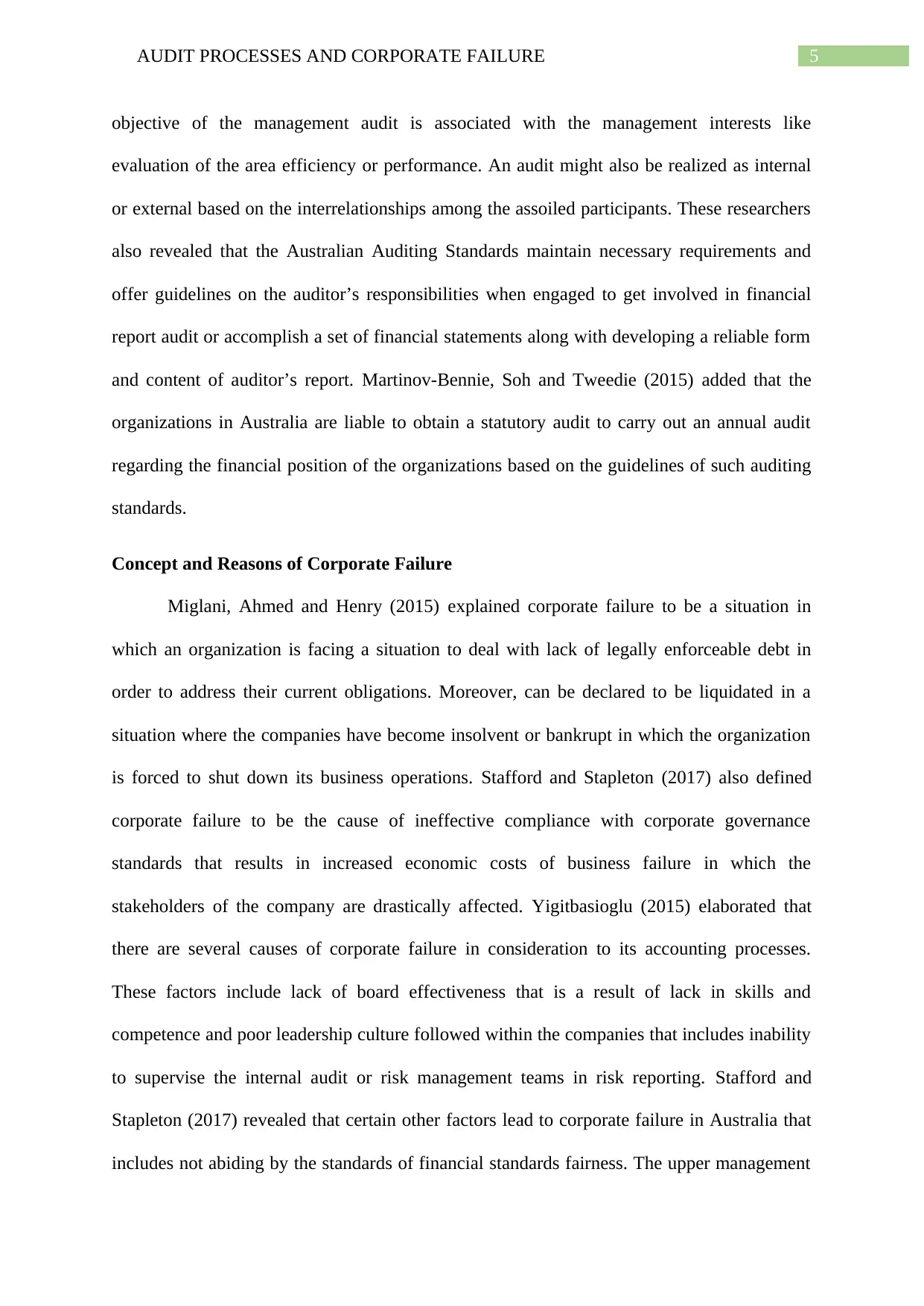
5AUDIT PROCESSES AND CORPORATE FAILURE
objective of the management audit is associated with the management interests like
evaluation of the area efficiency or performance. An audit might also be realized as internal
or external based on the interrelationships among the assoiled participants. These researchers
also revealed that the Australian Auditing Standards maintain necessary requirements and
offer guidelines on the auditor’s responsibilities when engaged to get involved in financial
report audit or accomplish a set of financial statements along with developing a reliable form
and content of auditor’s report. Martinov-Bennie, Soh and Tweedie (2015) added that the
organizations in Australia are liable to obtain a statutory audit to carry out an annual audit
regarding the financial position of the organizations based on the guidelines of such auditing
standards.
Concept and Reasons of Corporate Failure
Miglani, Ahmed and Henry (2015) explained corporate failure to be a situation in
which an organization is facing a situation to deal with lack of legally enforceable debt in
order to address their current obligations. Moreover, can be declared to be liquidated in a
situation where the companies have become insolvent or bankrupt in which the organization
is forced to shut down its business operations. Stafford and Stapleton (2017) also defined
corporate failure to be the cause of ineffective compliance with corporate governance
standards that results in increased economic costs of business failure in which the
stakeholders of the company are drastically affected. Yigitbasioglu (2015) elaborated that
there are several causes of corporate failure in consideration to its accounting processes.
These factors include lack of board effectiveness that is a result of lack in skills and
competence and poor leadership culture followed within the companies that includes inability
to supervise the internal audit or risk management teams in risk reporting. Stafford and
Stapleton (2017) revealed that certain other factors lead to corporate failure in Australia that
includes not abiding by the standards of financial standards fairness. The upper management
objective of the management audit is associated with the management interests like
evaluation of the area efficiency or performance. An audit might also be realized as internal
or external based on the interrelationships among the assoiled participants. These researchers
also revealed that the Australian Auditing Standards maintain necessary requirements and
offer guidelines on the auditor’s responsibilities when engaged to get involved in financial
report audit or accomplish a set of financial statements along with developing a reliable form
and content of auditor’s report. Martinov-Bennie, Soh and Tweedie (2015) added that the
organizations in Australia are liable to obtain a statutory audit to carry out an annual audit
regarding the financial position of the organizations based on the guidelines of such auditing
standards.
Concept and Reasons of Corporate Failure
Miglani, Ahmed and Henry (2015) explained corporate failure to be a situation in
which an organization is facing a situation to deal with lack of legally enforceable debt in
order to address their current obligations. Moreover, can be declared to be liquidated in a
situation where the companies have become insolvent or bankrupt in which the organization
is forced to shut down its business operations. Stafford and Stapleton (2017) also defined
corporate failure to be the cause of ineffective compliance with corporate governance
standards that results in increased economic costs of business failure in which the
stakeholders of the company are drastically affected. Yigitbasioglu (2015) elaborated that
there are several causes of corporate failure in consideration to its accounting processes.
These factors include lack of board effectiveness that is a result of lack in skills and
competence and poor leadership culture followed within the companies that includes inability
to supervise the internal audit or risk management teams in risk reporting. Stafford and
Stapleton (2017) revealed that certain other factors lead to corporate failure in Australia that
includes not abiding by the standards of financial standards fairness. The upper management
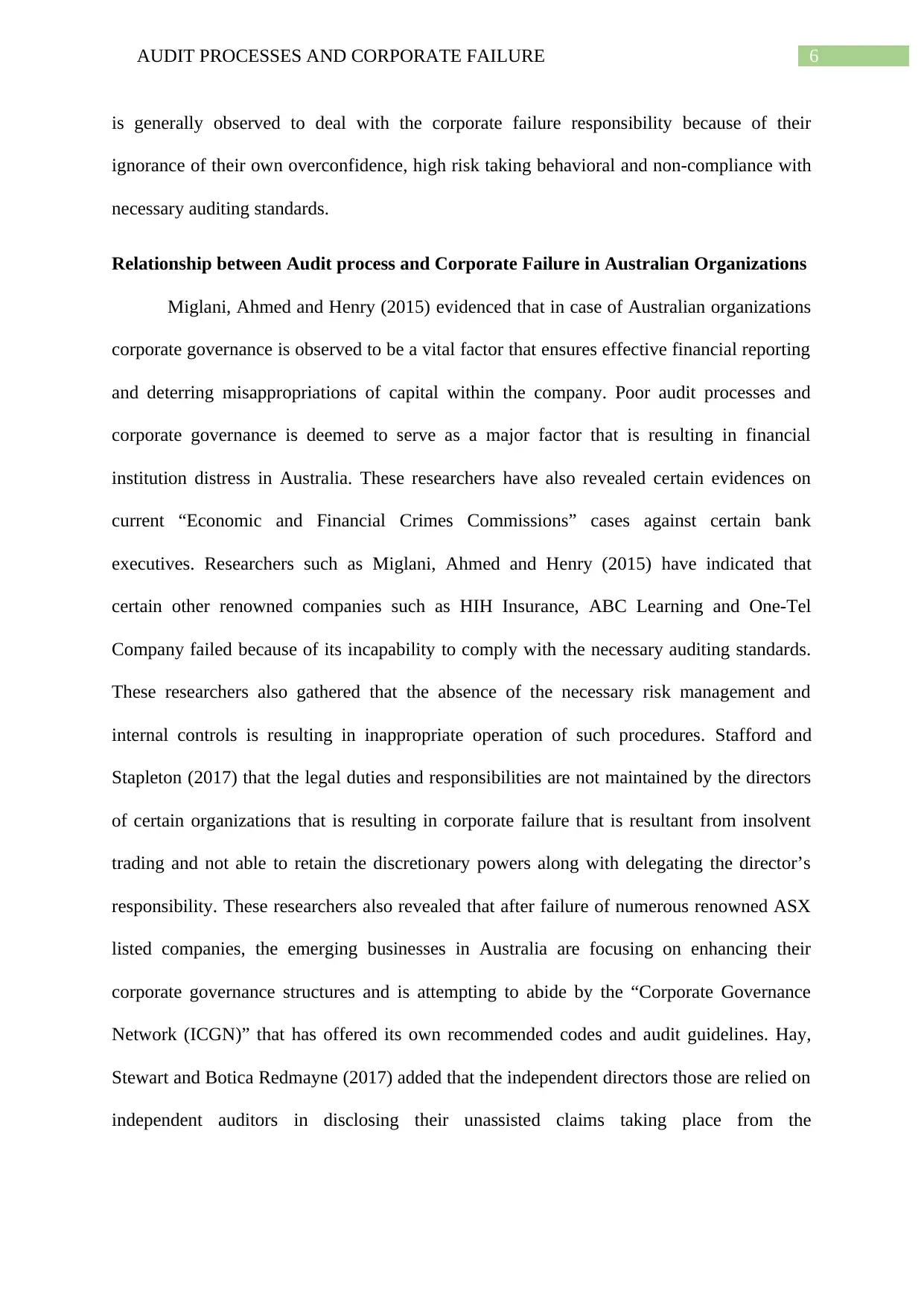
6AUDIT PROCESSES AND CORPORATE FAILURE
is generally observed to deal with the corporate failure responsibility because of their
ignorance of their own overconfidence, high risk taking behavioral and non-compliance with
necessary auditing standards.
Relationship between Audit process and Corporate Failure in Australian Organizations
Miglani, Ahmed and Henry (2015) evidenced that in case of Australian organizations
corporate governance is observed to be a vital factor that ensures effective financial reporting
and deterring misappropriations of capital within the company. Poor audit processes and
corporate governance is deemed to serve as a major factor that is resulting in financial
institution distress in Australia. These researchers have also revealed certain evidences on
current “Economic and Financial Crimes Commissions” cases against certain bank
executives. Researchers such as Miglani, Ahmed and Henry (2015) have indicated that
certain other renowned companies such as HIH Insurance, ABC Learning and One-Tel
Company failed because of its incapability to comply with the necessary auditing standards.
These researchers also gathered that the absence of the necessary risk management and
internal controls is resulting in inappropriate operation of such procedures. Stafford and
Stapleton (2017) that the legal duties and responsibilities are not maintained by the directors
of certain organizations that is resulting in corporate failure that is resultant from insolvent
trading and not able to retain the discretionary powers along with delegating the director’s
responsibility. These researchers also revealed that after failure of numerous renowned ASX
listed companies, the emerging businesses in Australia are focusing on enhancing their
corporate governance structures and is attempting to abide by the “Corporate Governance
Network (ICGN)” that has offered its own recommended codes and audit guidelines. Hay,
Stewart and Botica Redmayne (2017) added that the independent directors those are relied on
independent auditors in disclosing their unassisted claims taking place from the
is generally observed to deal with the corporate failure responsibility because of their
ignorance of their own overconfidence, high risk taking behavioral and non-compliance with
necessary auditing standards.
Relationship between Audit process and Corporate Failure in Australian Organizations
Miglani, Ahmed and Henry (2015) evidenced that in case of Australian organizations
corporate governance is observed to be a vital factor that ensures effective financial reporting
and deterring misappropriations of capital within the company. Poor audit processes and
corporate governance is deemed to serve as a major factor that is resulting in financial
institution distress in Australia. These researchers have also revealed certain evidences on
current “Economic and Financial Crimes Commissions” cases against certain bank
executives. Researchers such as Miglani, Ahmed and Henry (2015) have indicated that
certain other renowned companies such as HIH Insurance, ABC Learning and One-Tel
Company failed because of its incapability to comply with the necessary auditing standards.
These researchers also gathered that the absence of the necessary risk management and
internal controls is resulting in inappropriate operation of such procedures. Stafford and
Stapleton (2017) that the legal duties and responsibilities are not maintained by the directors
of certain organizations that is resulting in corporate failure that is resultant from insolvent
trading and not able to retain the discretionary powers along with delegating the director’s
responsibility. These researchers also revealed that after failure of numerous renowned ASX
listed companies, the emerging businesses in Australia are focusing on enhancing their
corporate governance structures and is attempting to abide by the “Corporate Governance
Network (ICGN)” that has offered its own recommended codes and audit guidelines. Hay,
Stewart and Botica Redmayne (2017) added that the independent directors those are relied on
independent auditors in disclosing their unassisted claims taking place from the
Paraphrase This Document
Need a fresh take? Get an instant paraphrase of this document with our AI Paraphraser
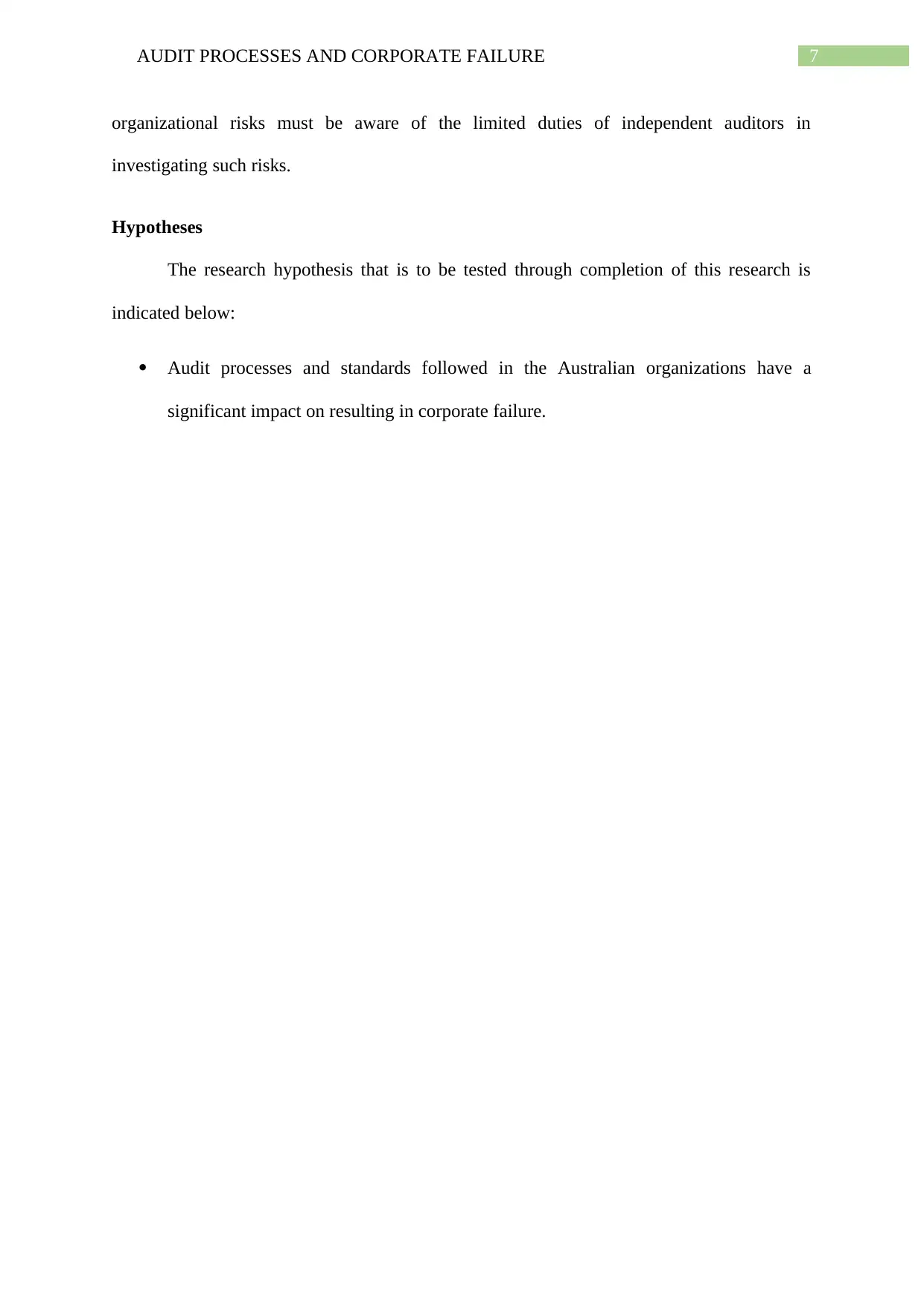
7AUDIT PROCESSES AND CORPORATE FAILURE
organizational risks must be aware of the limited duties of independent auditors in
investigating such risks.
Hypotheses
The research hypothesis that is to be tested through completion of this research is
indicated below:
Audit processes and standards followed in the Australian organizations have a
significant impact on resulting in corporate failure.
organizational risks must be aware of the limited duties of independent auditors in
investigating such risks.
Hypotheses
The research hypothesis that is to be tested through completion of this research is
indicated below:
Audit processes and standards followed in the Australian organizations have a
significant impact on resulting in corporate failure.
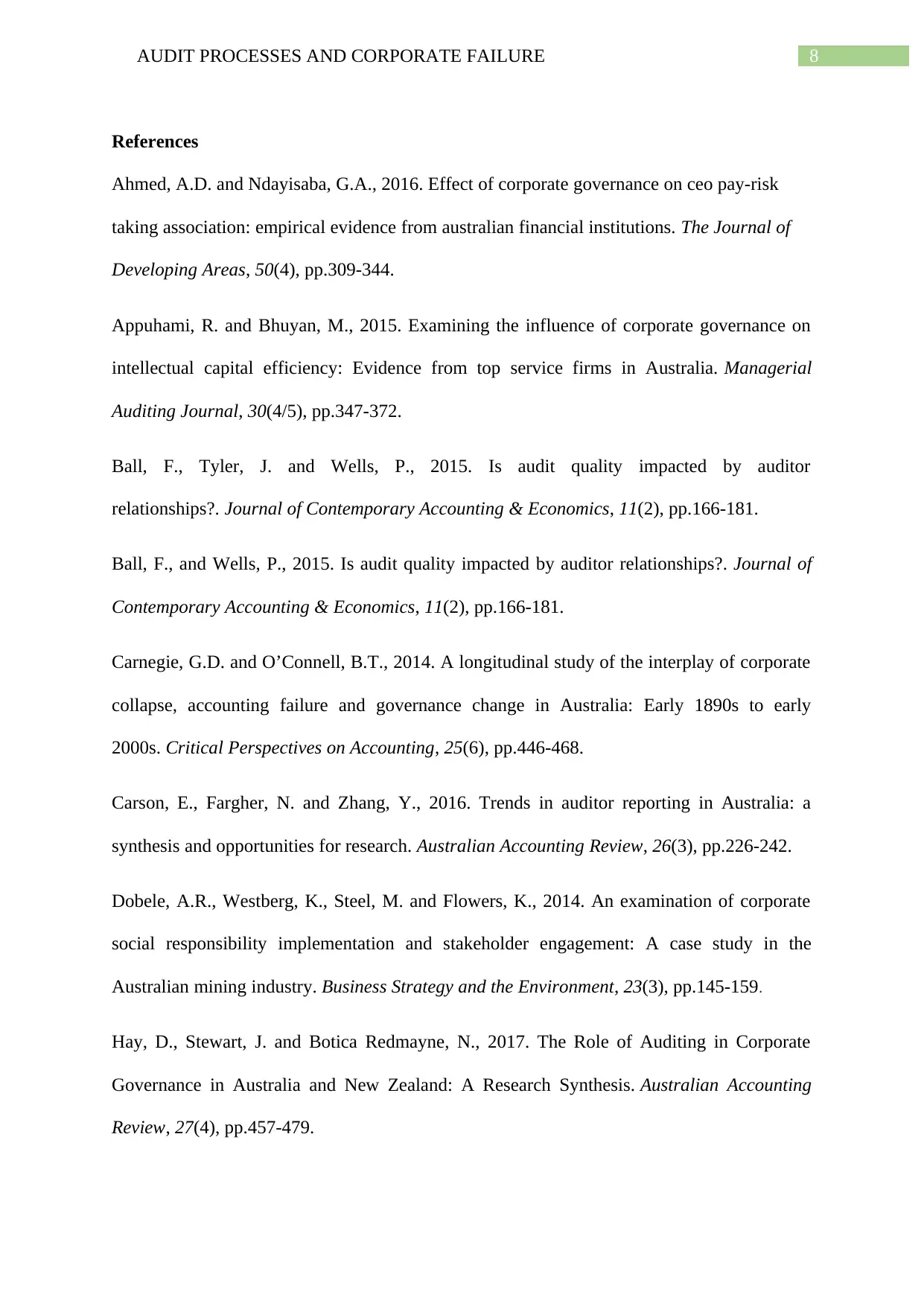
8AUDIT PROCESSES AND CORPORATE FAILURE
References
Ahmed, A.D. and Ndayisaba, G.A., 2016. Effect of corporate governance on ceo pay-risk
taking association: empirical evidence from australian financial institutions. The Journal of
Developing Areas, 50(4), pp.309-344.
Appuhami, R. and Bhuyan, M., 2015. Examining the influence of corporate governance on
intellectual capital efficiency: Evidence from top service firms in Australia. Managerial
Auditing Journal, 30(4/5), pp.347-372.
Ball, F., Tyler, J. and Wells, P., 2015. Is audit quality impacted by auditor
relationships?. Journal of Contemporary Accounting & Economics, 11(2), pp.166-181.
Ball, F., and Wells, P., 2015. Is audit quality impacted by auditor relationships?. Journal of
Contemporary Accounting & Economics, 11(2), pp.166-181.
Carnegie, G.D. and O’Connell, B.T., 2014. A longitudinal study of the interplay of corporate
collapse, accounting failure and governance change in Australia: Early 1890s to early
2000s. Critical Perspectives on Accounting, 25(6), pp.446-468.
Carson, E., Fargher, N. and Zhang, Y., 2016. Trends in auditor reporting in Australia: a
synthesis and opportunities for research. Australian Accounting Review, 26(3), pp.226-242.
Dobele, A.R., Westberg, K., Steel, M. and Flowers, K., 2014. An examination of corporate
social responsibility implementation and stakeholder engagement: A case study in the
Australian mining industry. Business Strategy and the Environment, 23(3), pp.145-159.
Hay, D., Stewart, J. and Botica Redmayne, N., 2017. The Role of Auditing in Corporate
Governance in Australia and New Zealand: A Research Synthesis. Australian Accounting
Review, 27(4), pp.457-479.
References
Ahmed, A.D. and Ndayisaba, G.A., 2016. Effect of corporate governance on ceo pay-risk
taking association: empirical evidence from australian financial institutions. The Journal of
Developing Areas, 50(4), pp.309-344.
Appuhami, R. and Bhuyan, M., 2015. Examining the influence of corporate governance on
intellectual capital efficiency: Evidence from top service firms in Australia. Managerial
Auditing Journal, 30(4/5), pp.347-372.
Ball, F., Tyler, J. and Wells, P., 2015. Is audit quality impacted by auditor
relationships?. Journal of Contemporary Accounting & Economics, 11(2), pp.166-181.
Ball, F., and Wells, P., 2015. Is audit quality impacted by auditor relationships?. Journal of
Contemporary Accounting & Economics, 11(2), pp.166-181.
Carnegie, G.D. and O’Connell, B.T., 2014. A longitudinal study of the interplay of corporate
collapse, accounting failure and governance change in Australia: Early 1890s to early
2000s. Critical Perspectives on Accounting, 25(6), pp.446-468.
Carson, E., Fargher, N. and Zhang, Y., 2016. Trends in auditor reporting in Australia: a
synthesis and opportunities for research. Australian Accounting Review, 26(3), pp.226-242.
Dobele, A.R., Westberg, K., Steel, M. and Flowers, K., 2014. An examination of corporate
social responsibility implementation and stakeholder engagement: A case study in the
Australian mining industry. Business Strategy and the Environment, 23(3), pp.145-159.
Hay, D., Stewart, J. and Botica Redmayne, N., 2017. The Role of Auditing in Corporate
Governance in Australia and New Zealand: A Research Synthesis. Australian Accounting
Review, 27(4), pp.457-479.
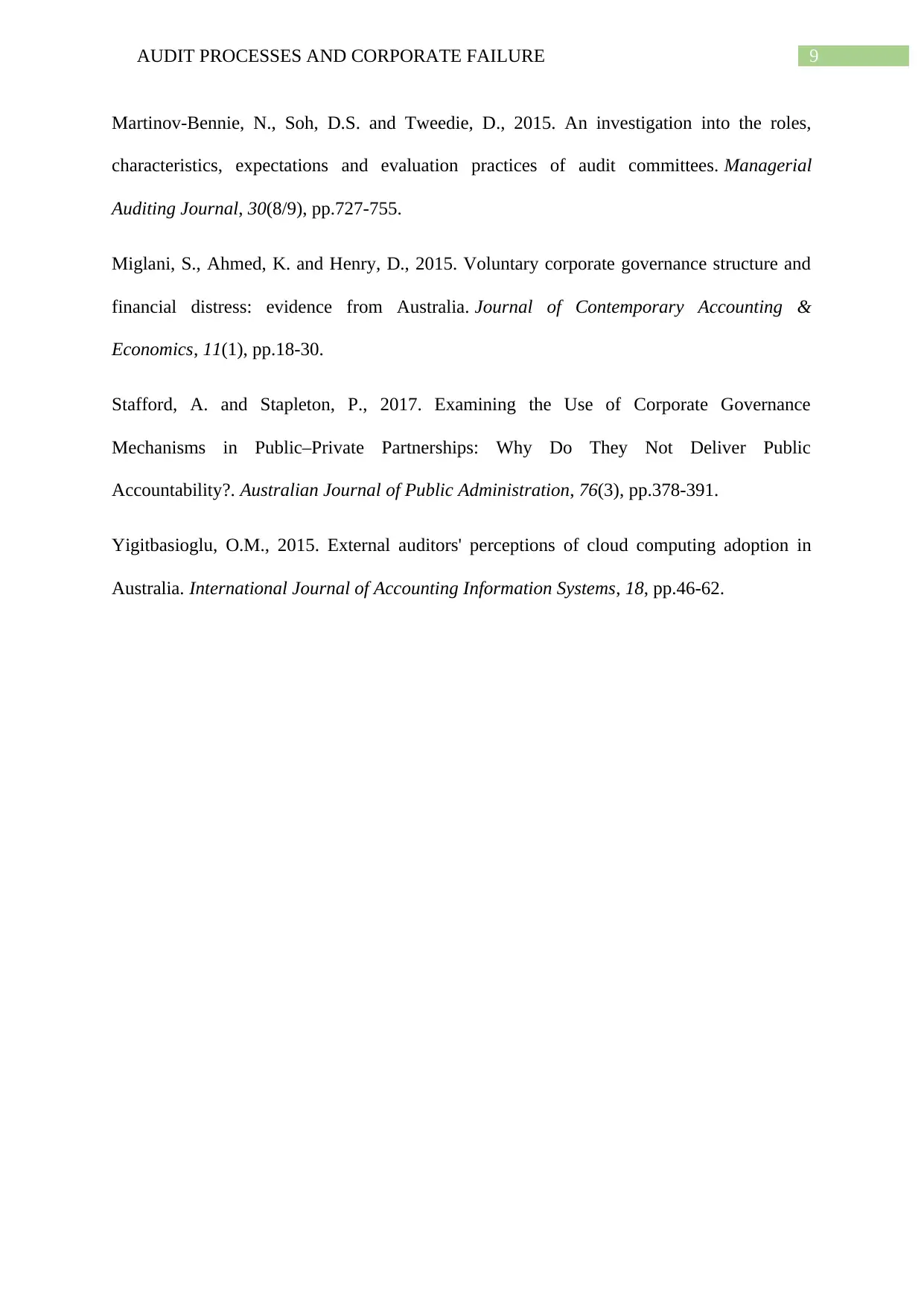
9AUDIT PROCESSES AND CORPORATE FAILURE
Martinov-Bennie, N., Soh, D.S. and Tweedie, D., 2015. An investigation into the roles,
characteristics, expectations and evaluation practices of audit committees. Managerial
Auditing Journal, 30(8/9), pp.727-755.
Miglani, S., Ahmed, K. and Henry, D., 2015. Voluntary corporate governance structure and
financial distress: evidence from Australia. Journal of Contemporary Accounting &
Economics, 11(1), pp.18-30.
Stafford, A. and Stapleton, P., 2017. Examining the Use of Corporate Governance
Mechanisms in Public–Private Partnerships: Why Do They Not Deliver Public
Accountability?. Australian Journal of Public Administration, 76(3), pp.378-391.
Yigitbasioglu, O.M., 2015. External auditors' perceptions of cloud computing adoption in
Australia. International Journal of Accounting Information Systems, 18, pp.46-62.
Martinov-Bennie, N., Soh, D.S. and Tweedie, D., 2015. An investigation into the roles,
characteristics, expectations and evaluation practices of audit committees. Managerial
Auditing Journal, 30(8/9), pp.727-755.
Miglani, S., Ahmed, K. and Henry, D., 2015. Voluntary corporate governance structure and
financial distress: evidence from Australia. Journal of Contemporary Accounting &
Economics, 11(1), pp.18-30.
Stafford, A. and Stapleton, P., 2017. Examining the Use of Corporate Governance
Mechanisms in Public–Private Partnerships: Why Do They Not Deliver Public
Accountability?. Australian Journal of Public Administration, 76(3), pp.378-391.
Yigitbasioglu, O.M., 2015. External auditors' perceptions of cloud computing adoption in
Australia. International Journal of Accounting Information Systems, 18, pp.46-62.
Secure Best Marks with AI Grader
Need help grading? Try our AI Grader for instant feedback on your assignments.
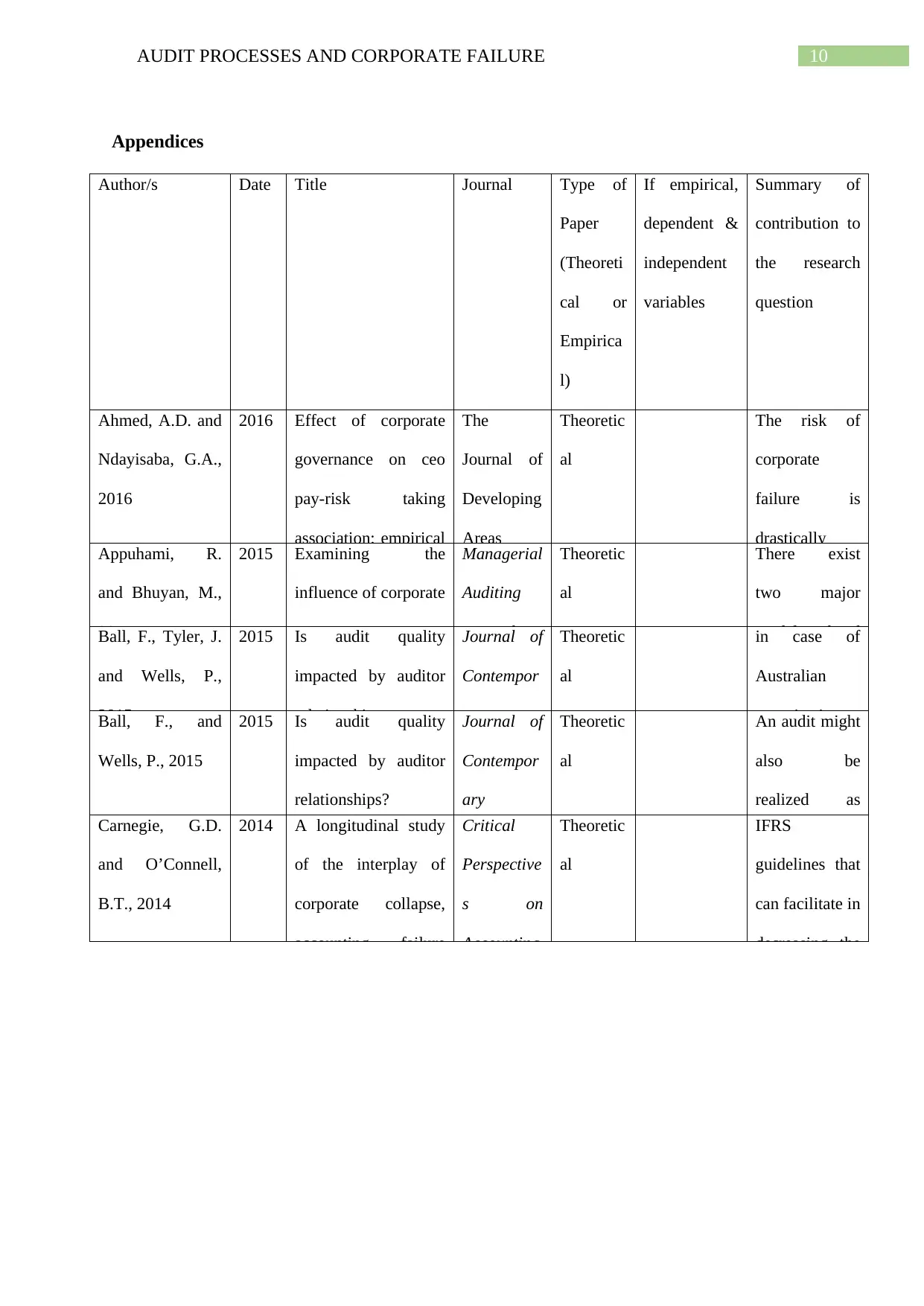
10AUDIT PROCESSES AND CORPORATE FAILURE
Appendices
Author/s Date Title Journal Type of
Paper
(Theoreti
cal or
Empirica
l)
If empirical,
dependent &
independent
variables
Summary of
contribution to
the research
question
Ahmed, A.D. and
Ndayisaba, G.A.,
2016
2016 Effect of corporate
governance on ceo
pay-risk taking
association: empirical
The
Journal of
Developing
Areas
Theoretic
al
The risk of
corporate
failure is
drastically
Appuhami, R.
and Bhuyan, M.,
2015
2015 Examining the
influence of corporate
governance on
Managerial
Auditing
Journal
Theoretic
al
There exist
two major
models relatedBall, F., Tyler, J.
and Wells, P.,
2015
2015 Is audit quality
impacted by auditor
relationships
Journal of
Contempor
ary
Theoretic
al
in case of
Australian
organizationsBall, F., and
Wells, P., 2015
2015 Is audit quality
impacted by auditor
relationships?
Journal of
Contempor
ary
Accounting
Theoretic
al
An audit might
also be
realized as
internal or
Carnegie, G.D.
and O’Connell,
B.T., 2014
2014 A longitudinal study
of the interplay of
corporate collapse,
accounting failure
Critical
Perspective
s on
Accounting
Theoretic
al
IFRS
guidelines that
can facilitate in
decreasing the
Appendices
Author/s Date Title Journal Type of
Paper
(Theoreti
cal or
Empirica
l)
If empirical,
dependent &
independent
variables
Summary of
contribution to
the research
question
Ahmed, A.D. and
Ndayisaba, G.A.,
2016
2016 Effect of corporate
governance on ceo
pay-risk taking
association: empirical
The
Journal of
Developing
Areas
Theoretic
al
The risk of
corporate
failure is
drastically
Appuhami, R.
and Bhuyan, M.,
2015
2015 Examining the
influence of corporate
governance on
Managerial
Auditing
Journal
Theoretic
al
There exist
two major
models relatedBall, F., Tyler, J.
and Wells, P.,
2015
2015 Is audit quality
impacted by auditor
relationships
Journal of
Contempor
ary
Theoretic
al
in case of
Australian
organizationsBall, F., and
Wells, P., 2015
2015 Is audit quality
impacted by auditor
relationships?
Journal of
Contempor
ary
Accounting
Theoretic
al
An audit might
also be
realized as
internal or
Carnegie, G.D.
and O’Connell,
B.T., 2014
2014 A longitudinal study
of the interplay of
corporate collapse,
accounting failure
Critical
Perspective
s on
Accounting
Theoretic
al
IFRS
guidelines that
can facilitate in
decreasing the
1 out of 11
Related Documents
Your All-in-One AI-Powered Toolkit for Academic Success.
+13062052269
info@desklib.com
Available 24*7 on WhatsApp / Email
![[object Object]](/_next/static/media/star-bottom.7253800d.svg)
Unlock your academic potential
© 2024 | Zucol Services PVT LTD | All rights reserved.





